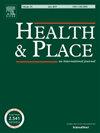To stay or grow? Migration patterns and child growth in rural Bihar, India
IF 4.1
2区 医学
Q1 PUBLIC, ENVIRONMENTAL & OCCUPATIONAL HEALTH
引用次数: 0
Abstract
While the dominant patterns of migration for livelihood among the poor in India are rural-to-rural and circular, literature on the health implications of child migration has largely focused on rural-to-urban, permanent movement. We compared child growth across three migration typologies rural Bihar: circular migrant families that repeatedly migrate to rural destination sites with accompanying young children, rural households with male migrants, and rural households that do not engage in migration. We integrated network theory based on caste and tribe geography to inform our analytical approach. Our results demonstrate complex associations between nutrition status and repeated movement of children between home and destination spaces. In addition to the policy imperative of multilocational strategies for migrant families, households that do not engage in migration yet are located in high outmigration regions also require targeted livelihood and health interventions.
留下还是成长?印度比哈尔邦农村地区的迁移模式与儿童成长。
印度贫困人口为谋生而迁移的主要模式是农村到农村和循环迁移,而有关儿童迁移对健康影响的文献则主要集中于农村到城市的永久性迁移。我们比较了比哈尔邦三种移民类型的儿童成长情况:带着年幼子女反复迁移到农村目的地的循环移民家庭、有男性移民的农村家庭以及没有移民的农村家庭。我们将基于种姓和部落地理学的网络理论纳入分析方法。我们的研究结果表明,营养状况与儿童在家乡和目的地之间的反复迁移之间存在复杂的关联。除了在政策上必须为移民家庭制定多地迁移战略外,位于人口外流高发地区的非移民家庭也需要有针对性的生计和健康干预措施。
本文章由计算机程序翻译,如有差异,请以英文原文为准。
求助全文
约1分钟内获得全文
求助全文
来源期刊

Health & Place
PUBLIC, ENVIRONMENTAL & OCCUPATIONAL HEALTH-
CiteScore
7.70
自引率
6.20%
发文量
176
审稿时长
29 days
期刊介绍:
he journal is an interdisciplinary journal dedicated to the study of all aspects of health and health care in which place or location matters.
 求助内容:
求助内容: 应助结果提醒方式:
应助结果提醒方式:


